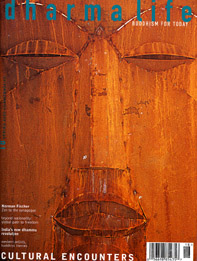Thaw in Sri Lanka
For 18 years Sri Lanka has been divided by a bloody civil war that has claimed 64,000 lives. Hindu Tamils in the north of the island have fought for autonomy from the Buddhist Sinhalese who make up 70% of the island's population. At last a ceasefire has been agreed and peace beckons.
The breakthrough came with victory in the December general election for the United National Front (UNF), on a platform offering peace. This ended a long period of rule by the People's Alliance (PA), which was widely considered corrupt, and presided over a prolonged crisis in Sri Lanka's economy (one of the poorest in the world). However UNP Prime Minister Ranil Wickramasinghe still shares power with President Chandrika Kumaratunga, the PA leader, whose attitude to the peace talks is far more cautious than his. During the bitterly-fought election the UNP's opponents accused it of selling out to the Tamil Tiger guerrillas and more than 40 people were killed in violence surrounding the election.
Following the election the Tigers declared a unilateral ceasefire, the Sri Lankan government reciprocated, and a team of Norwegian mediators started to smooth the way for formal talks between the two sides. Euphoria across the country at the prospect of peace is tempered by memories of abortive peace initiatives in the past. In 1994 Ms Kumaratunga was herself elected on a peace platform. Tamils hailed her as queen of peace, but military clashes turned things sour and the war resumed.
Signs of a new mood abound. The government has removed military checkpoints around the country and some roads in high-security zones have been reopened after nearly a decade. A powerful symbol of the change came with the loosening of security around the Sri Maha Bodi tree in the ancient Buddhist city of Anaradhapura - a close descendent of the tree that sheltered the Buddha when he attained Enlightenment. Until now the tree has been guarded from attack by more than 1,000 soldiers and police armed with automatic assault rifles. So far the truce has held, with both sides promising to refrain from military incursions into the other's territory.
In a significant change of policy senior Buddhist monks, who have long supported hard-line Sinhalese nationalism, have also offered cautious support to the peace initiative. Until recently most have argued that giving autonomy to Tamil regions would lead to the disintegration of the country, and only last summer several hundred monks marched in protest against peace proposals. But Ven. Buddharakkhita, one of the country's leading bhikkhus, said that the monastic establishment would not oppose autonomy for Tamil regions, although they would oppose any arrangement that would result in a division of the country.
While mistrust is deeply embedded among all participants, the widespread desire for peace is backed by international pressure. Following September 11 Tamil Tiger funds were frozen, its fund-raising capacity was crippled, and it was banned in many countries. Despite affinity with the Tamil cause, the Indian government has proscribed the Tigers ever since their involvement in Rajiv Gandhi's assassination. Meanwhile the Sri Lankan government is desperate for an end to the war that has damaged its economy and limited its access to aid. Since September 11 it has suffered further from the dramatic decline in tourism that has affected the whole of Asia.
Sri Lanka is one of the world's most beautiful countries, with an ancient Buddhist heritage and a high level of education. For years, however, it has been crippled by war and the nationalist legacy of the colonial period. Buddhists around the world will hope that peace is found and that the country can fulfil its potential as a centre of Buddhism.



